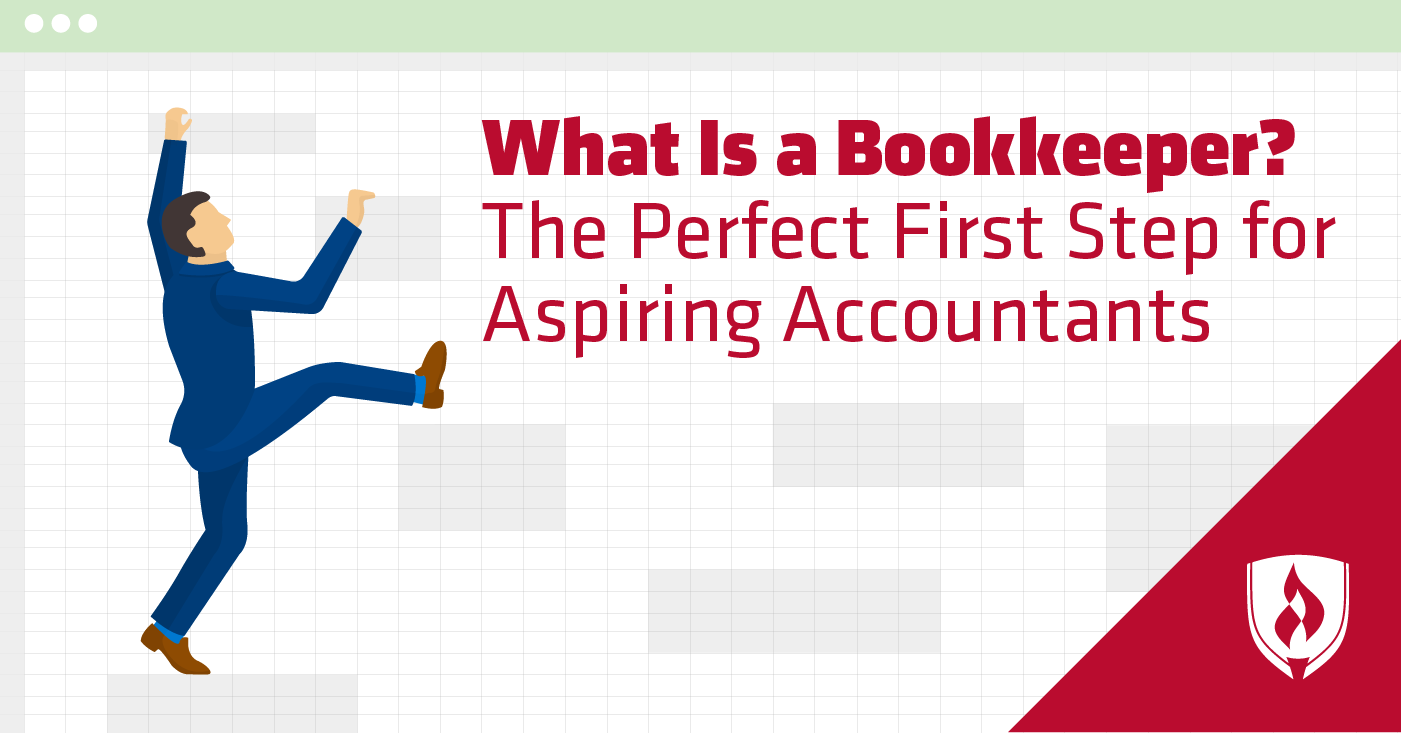What Is a Bookkeeper? The Perfect First Step for Aspiring Accountants
By Ashley Brooks on 03/11/2019

You’ve always had an organized, type-A personality. With your current job feeling a bit stale, your first instinct is to make a list of goals and options for your future career. You have a pros-and-cons list for a dozen different job titles, but nothing has seemed like the right fit for you.
You’re not giving up yet, though! Bookkeeping recently made it to your radar, and you have a hunch that this career might be different from all the rest. What is a bookkeeper? Could this business role be the perfect match—considering your head for numbers and organizational skills?
We have the lowdown on everything you need to know about a career as a bookkeeper, including what you need to get started and where this career can take you in the future. Take a look at this in-depth career description to help you decide whether bookkeeping is a job title that can take you where you want to go!
What does a bookkeeper do?
Bookkeepers help organizations keep accurate financial records, including tracking income, expenses, overdue accounts and pending invoices. “Bookkeepers are a fundamental part of any business or organization and their skills are heavily relied upon,” says Sean Winkel, accountant at Easier Accounting.
A bookkeeper’s daily job duties vary quite a bit depending on the size of the company they work for. In general, a bookkeeper’s job includes “reconciling bank statements, classifying transactions, posting journal entries, and preparing financial statements for managers and executives,” Winkel says.
Bookkeepers often work on their own to track financial information and prepare reports, but they don’t fly solo all the time. The Bureau of Labor Statistics (BLS) shares that bookkeepers can also expect to collaborate with accountants, managers and auditors as they work together to review their organization’s financial information.1
Where do bookkeepers work?
Companies in all industries benefit from the careful financial and organizational skills of bookkeepers, meaning bookkeepers have a wide variety of work environments available to them. “Generally, bookkeepers work in the accounting department of a business or organization under an accountant,” Winkel says.
Larger organizations are likely to have a team of bookkeepers with each bookkeeper focusing on a particular specialty, such as accounts payable or accounts receivable. Smaller companies, on the other hand, are more likely to have bookkeepers that perform a wide range of accounting tasks.
Bookkeepers aren’t always employed directly for a company, however. Many bookkeepers work for multiple clients, either through an accounting firm or as a self-employed freelancer. These bookkeepers often travel to their clients’ place of business to discuss financial information and review reports.
What skills do bookkeepers need?
Don’t be intimidated by this financially focused career! Bookkeepers do spend a lot of time with numbers, but the BLS reports that much of this is basic mathematics. You might even be surprised to learn that there’s more to bookkeeping than crunching numbers.
“Bookkeeping requires a good understanding of the accounting process as well as good communication skills,” Winkel says. “Bookkeepers are expected to communicate with management and executives about transactions and assist them in business decisions.”
You might be wondering what else it takes to have a successful bookkeeping career. To help answer that, we used real-time job analysis software to uncover the most in-demand skills for bookkeepers:2
- Accounts payable/receivable
- Data entry
- Invoice processing
- Customer billing
- Account reconciliation
- Accounting software
- General ledger
- Spreadsheets
- Expense reports
What is the job outlook for bookkeepers?
You can see that bookkeepers are a vital part of any organization. Though employment growth for bookkeepers has shown little to no change in recent years, according to the BLS, there are still more than 1.7 million bookkeeping jobs across the nation.1
What advancement opportunities are there for bookkeepers?
The last thing you want is another dead-end career that leaves you with few advancement opportunities. Thankfully, a bookkeeping position provides an excellent jumping-off point for advancing into other accounting positions.
Bookkeepers are entry-level employees in accounting departments. Because such positions typically only require a high school diploma or an Accounting Certificate, bookkeeping can be the perfect stepping-stone to other business, financial and accounting careers. Bookkeepers can continue to work while earning a related degree in Accounting—and some employers might even help pay for your higher education!
With an Accounting degree in hand and years of valuable bookkeeping experience under your belt, you’ll be qualified for more advanced business positions. You can do a lot with an Accounting degree, including becoming an accountant, financial advisor, audit manager or business analyst.
Bookkeeping: The first step on your new career path
Now that you’re no longer wondering, “What is bookkeeping?” you can see that this financial career has the potential to be the first stepping-stone on your way to a bright future in the accounting world.
Learn more about where a background in bookkeeping can take you with our article “Accounting Career Paths: The Number Cruncher’s Guide.”
1Bureau of Labor Statistics, U.S. Department of Labor, Occupational Outlook Handbook, [information accessed November 21, 2018] www.bls.gov/ooh/. Employment conditions in your area may vary.
2Burning-Glass.com (analysis of 214,744 bookkeeper job postings, Nov. 01, 2017 - Oct. 31, 2018).




